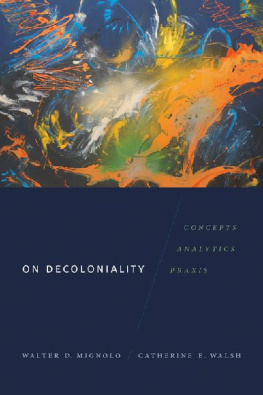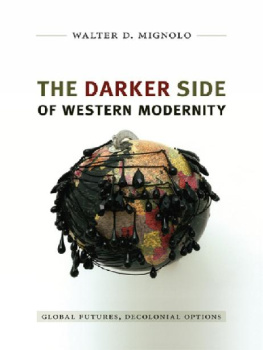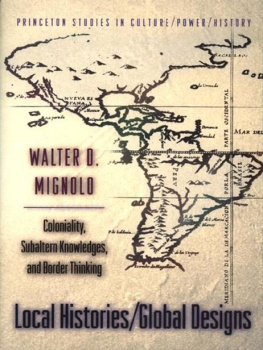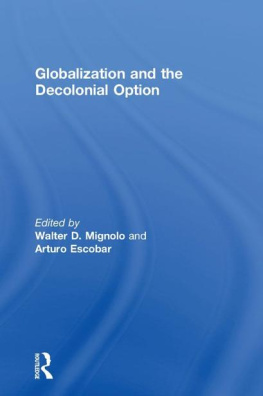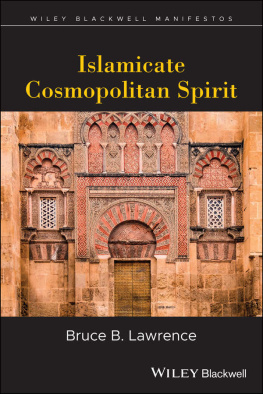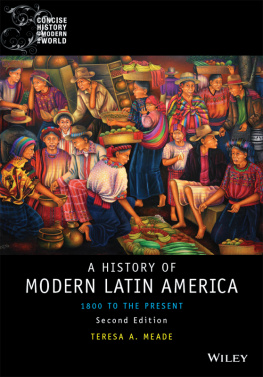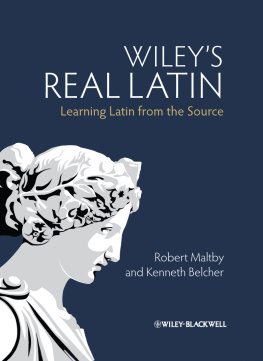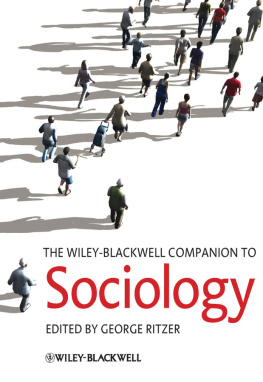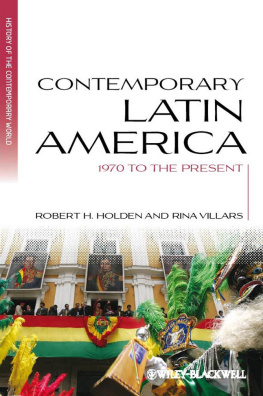Walter D. Mignolo - The Idea of Latin America (Wiley-Blackwell Manifestos)
Here you can read online Walter D. Mignolo - The Idea of Latin America (Wiley-Blackwell Manifestos) full text of the book (entire story) in english for free. Download pdf and epub, get meaning, cover and reviews about this ebook. year: 2007, genre: Politics. Description of the work, (preface) as well as reviews are available. Best literature library LitArk.com created for fans of good reading and offers a wide selection of genres:
Romance novel
Science fiction
Adventure
Detective
Science
History
Home and family
Prose
Art
Politics
Computer
Non-fiction
Religion
Business
Children
Humor
Choose a favorite category and find really read worthwhile books. Enjoy immersion in the world of imagination, feel the emotions of the characters or learn something new for yourself, make an fascinating discovery.

- Book:The Idea of Latin America (Wiley-Blackwell Manifestos)
- Author:
- Genre:
- Year:2007
- Rating:5 / 5
- Favourites:Add to favourites
- Your mark:
- 100
- 1
- 2
- 3
- 4
- 5
The Idea of Latin America (Wiley-Blackwell Manifestos): summary, description and annotation
We offer to read an annotation, description, summary or preface (depends on what the author of the book "The Idea of Latin America (Wiley-Blackwell Manifestos)" wrote himself). If you haven't found the necessary information about the book — write in the comments, we will try to find it.
The Idea of Latin America (Wiley-Blackwell Manifestos) — read online for free the complete book (whole text) full work
Below is the text of the book, divided by pages. System saving the place of the last page read, allows you to conveniently read the book "The Idea of Latin America (Wiley-Blackwell Manifestos)" online for free, without having to search again every time where you left off. Put a bookmark, and you can go to the page where you finished reading at any time.
Font size:
Interval:
Bookmark:
The Idea of Latin America
Blackwell Manifestos
In this new series major critics make timely interventions to address important concepts and subjects, including topics as diverse as, for example: Culture, Race, Religion, History, Society, Geography, Literature, Literary Theory, Shakespeare, Cinema, and Modernism. Written accessibly and with verve and spirit, these books follow no uniform prescription but set out to engage and challenge the broadest range of readers, from undergraduates to postgraduates, university teachers and general readers - all those, in short, interested in ongoing debates and controversies in the humanities and social sciences.
Already Published
The Idea of Culture Terry Eagleton The Future of Christianity Alister E. McGrath Reading After Theory Valentine Cunningham 21st-Century Modernism Marjorie Perloff The Future of Theory Jean-Michel Rabate True Religion Graham Ward Inventing Popular Culture John Storey Myths for the Masses Hanno Hardt The Rhetoric of RHETORIC Wayne C. Booth The Future of War Christopher Coker When Faiths Collide Martin E. Marty The Future of Environmental Criticism Lawrence Buell The Idea of Latin America Walter D. Mignolo The Future of Society William Outhwaite
Forthcoming
What Cinema Is! Dudley Andrew The Battle for American Culture Michael Cowan The Idea of Evil Peter K. Dews Television: Literate at Last John Hartley The Idea of Economy Deirdre McCloskey The Idea of English Ethnicity Robert Young
The Idea of Latin America
Walter D. Mignolo


The Idea of Latin America
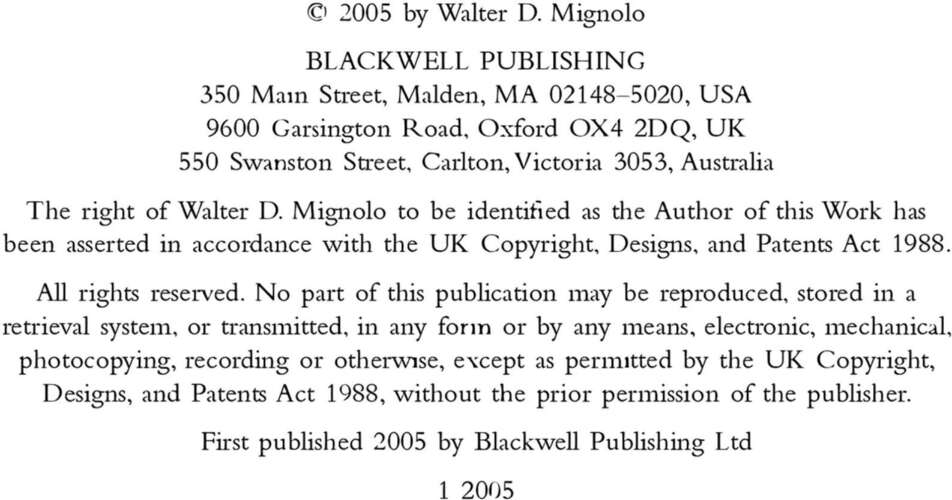






To Andrea and Alexander Wylie Mignolo, tireless interlocutors
Contents
Acknowledgments
Without the invitation ofAndrew McNeillie to write a monograph for the "Manifestos" series, this book would have never come into existence. And without the continuous work of the modernity/coloniality project, the narrative and argument would have not been what they are now. Participant members of the project, with whom I have met many times during the past two years, are Enrique Dussel (Argentina and Mexico), Anibal Quijano (Peru), Boaventura de Sousa Santos (Portugal), Catherine Walsh (Ecuador), Libia Grueso (Colombia), Marcelo Fernandez Osco (Bolivia and USA), Zulma Palermo (Argentina), Freya Schiwy (USA), Edgardo Lander (Venezuela), Fernando Coronil (Venezuela and USA), Javier Sanjines (Bolivia and USA), Jose D. Saldivar (USA), Ramon Grosfoguel (Puerto Rico and USA), Nelson Maldonado-Torres (Puerto Rico and USA), Agustin Lao-Montes (Puerto Rico and USA), Marisol de la Cadena (Peru and USA), Arturo Escobar (Colombia and USA), Eduardo Restrepo (Colombia and USA), Margarita Cervantes-Zalazar (Cuba and USA), Santiago Castro-Gomez (Colombia), and Oscar Guardiola (Colombia).
I am particularly indebted to Catherine Walsh for facilitating access to and conversations with members of the Indigenous and Afro-Ecuadorian social movements; to Javier Sanjines for opening many doors in Bolivia; and to Nelson Maldonado-Torres for facilitating contact with members of the Caribbean Philosophical Association and for sharing with me - verbally and in written forms - his path-breaking "Fanonian Meditations." Beyond their generosity with facilitating contacts, we spent hours of tireless conversations that contributed - indirectly - to shaping my arguments and to decolonizing the idea of Latin America. At Duke University, I have benefited from the conversation and advice of Leo Ching and Ralph Letzinger regarding the idea of Asia, and Roberto Dainotto taught me to rethink the idea of Europe from the Italian South. The professional advice of the three of them has been enhanced and complemented by many friendly and intellectual conversations, most of the time evolving toward shifting the geo-politics of knowledge and undoing (rather than rethinking) area studies.
My debt to V. Y. Mudimbe for his insightful studies on the idea and the invention of Africa goes back to 1993, when I moved from the University of Michigan to Duke. At Duke also I have benefited from working with graduate students, with whom I share the effort to understand from the perspective of people who have been reduced, by official histories in South America and imperial histories in Europe and the US, to being "understood." Ground-breaking research is being done by Michael Ennis in the literature program and Silvermoon in the history department on Nahuatls co-existing and struggling with imperial institutions in the sixteenth and seventeenth centuries; and by Gonzalo Lamana in the department of cultural anthropology, exploring the first twenty years of Spaniards being in Tawantinsuyu from the perspective of both Inca rulers and Spanish conquistadores. The three projects and researchers are shifting the geo-politics of knowledge and teaching us how to read the Spanish documents from the perspectives of Aztecs and Incas during the conquest and during colonial times. And I owe to Marcelo Fernandez Osco, an Aymara intellectual and graduate student at Duke, his perceptive views on Bolivian history and society and his continuing interventions in Andean scholarship and politics, which bring together in insightful ways the geo-political and body-political epistemic shift. It is this shifting that informs my decolonial archeology of the idea of Latin America. Last but not least, I am grateful to Lia Haro for her editorial skills and infinite patience; she read and re-read the last versions of the manuscript several times and did not stop asking questions, suggesting deletions and additions, moving paragraphs up or down. As the dictum goes, none of my advisors and collaborators is accountable for the final version of my argument.
Preface: Uncoupling the Name and the Reference
An excess of confidence has spread all over the world regarding the ontology of continental divides.' While it could be debated whether there are four, six, or seven continents, it is unquestionable that the count of six or seven includes the basic four-way subdivision of Asia, Africa, America, and Europe. That undisputed division underlies not only debates over continental divides but also ideas of East and West, North and South, and explicitly hierarchical categories such as first, Second, Third, and Fourth Worlds (the last a term invented to acconmiodate Indigenous people in the Americas, New Zealand, and Australia). It may be common practice to buy a plane ticket to "Australia" or "sub-Saharan Africa" as opposed to "north Africa," but the wide acceptance of those geographical designations hides the fact that the division of continents and the geo-political structures imposed upon them are all imperial constructions of the past five hundred years. A god did not create the planet earth and divide it, from the very beginning, into four continents. "America," the fourth, was appended to the three that had been imagined in Christianity, which St Augustine articulated in The City of God, as we will see in chapter 1.
Next pageFont size:
Interval:
Bookmark:
Similar books «The Idea of Latin America (Wiley-Blackwell Manifestos)»
Look at similar books to The Idea of Latin America (Wiley-Blackwell Manifestos). We have selected literature similar in name and meaning in the hope of providing readers with more options to find new, interesting, not yet read works.
Discussion, reviews of the book The Idea of Latin America (Wiley-Blackwell Manifestos) and just readers' own opinions. Leave your comments, write what you think about the work, its meaning or the main characters. Specify what exactly you liked and what you didn't like, and why you think so.

